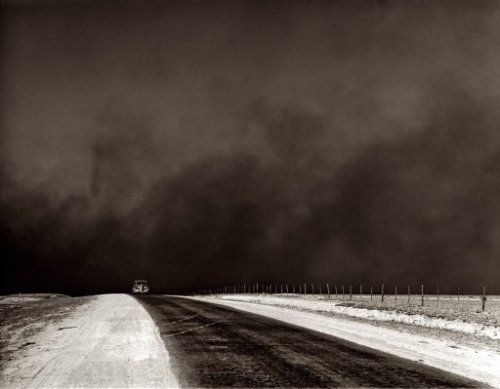Croppers (Sharecroppers)
In Chapter 2, the truck driver who gives young Tom Joad a ride talks about the croppers being pushed off the land by landowners, foreshadowing Joad’s return to his family’s house pushed over by a tractor.
Sharecropping was an old system in which landowners allowed tenants to work a parcel of land. As payment, the landowners received a fixed portion of the harvest, and the tenants were able to keep and/or sell the rest to support themselves.
The Dust Bowl
From the very first chapter, the landscape of Oklahoma becomes a central character in Steinbeck’s novel. Published in 1939, the novel is set during the latter part of the Great Depression during The Dirty Thirties (also called the Dust Bowl), when a combination of drought, extensive farming without crop rotation, severe dust storms (sometimes called “black blizzards”), and high winds plagued the Great Plains (mainly Texas, the panhandle of Texas, and neighboring parts of Kansas, Colorado, and New Mexico), stripping the top soil and wreaking major agricultural and ecological damage.

Regions Affected by the Dust Bowl in the 1930s.

A farmer and his two sons run to take cover from a dust storm, or black blizzard (Photo by Arthur Rothstein, 1936).

A dust storm approaches a prairie town.

Dry topsoil carried by high winds blacked out the sun and moved over the landscape, sometimes as far east as New York.

High winds and overworking the land blew the once-rich topsoil of the Great Plains clear to the Atlantic Ocea.
Charles Arthur “Pretty Boy” Floyd (Feb. 3, 1904 – Oct. 22, 1934)

The infamous bank robber "Pretty Boy" Floyd was something of a hero for those who had lost their land to big banks.
An Oklahoma native, Floyd’s criminal exploits earned him a reputation around the country along with other famous outlaws at the time, including figures like Bonnie and Clyde. Floyd was first arrested at the age of 18 for stealing about $3.00 from a local post office; three years later in 1925, he was arrested for payroll robbery, and did five years in prison. When paroled, he vowed he would never see the inside of a prison again. He sometimes paired up with other outlaws and committed a series of bank robberies that earned him his nickname. The police hunted Floyd across state lines, sometimes arresting him for smaller crimes such a vagrancy. Floyd and one of his associates were suspected of orchestrating the Kansas City Massacre, in which four officers were gunned down. In October of 1934, Floyd was finally gunned down in an apple orchard in Ohio after being pursued by local police and FBI agents all the way from New York.











